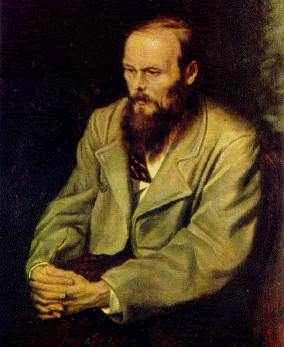
aaasuperb Russian Chant
Monastery of the Holy Trinity
There is something of a common thread that runs throughout the novels of Dostoevsky, the 19th century Russian writer: personal crises. Dostoevsky has long been recognized as a genius of psychological perception, writing at a time before psychology was a formal academic discipline. Many of his novels carry a relgious theme, particularly Crime and Punishment and The Brothers Karamazov. There are other personal crises in many of his other works - though none that compare with those two novels. It is in these personal crises that Dostoevsky introduces the reality of the Christian faith - in particular the Orthodox Christian faith. His characters frequently live in a state that is dangerously close to the edge of madness or self-destruction until they “come to their senses” and embrace the life of the gospel. He does not describe such conversions as instantaneous or easy.
But his recognition of the role of crisis in the conversion of the human soul is an important insight. American revivalism, born from roots in the First and Second Great Awakening, seeks to create crisis for the individual through preaching. Thus the famous and common references to Hell, or “if you were to die tonight do you know where you would go?” are attempts to foster crises within the human soul.
But a true crisis is not something which can simply be manufactured - at least not with any accuracy. I once worked with an Anglican priest who was very “high Church.” His services of Holy Week were about as complete as one could find in an Anglican setting. I remember him saying to me: “On Good Friday, when the service is complete, I don’t want anyone to know anything other than that Jesus is dead.” He wanted the crisis of the death of God to prepare the way for Easter. I understood his point but felt is was somehow, artificial. After all, everyone knew that Christ has been raised from the dead. The moment of surprise had long ago passed.
Indeed, in the services of Orthodox Holy Week, though the crucifixion and entombment of Christ are marked as profoundly as possible, they are always done so against the backdrop of Pascha. Thus there is no Eastern practice of refraining from “Alleluia” during Lent (as is the fashion in some Western Churches). Christ is never not risen and nothing we do makes sense unless it is placed in the context of Pascha.
Personal crises resist manufacture (and well they should). From the Christian point of view, inducing a crisis in someone’s life might very well have the character of sin (I would make exception for things such as drug interventions and the like, although even interventions fail from time to time). There is an integrity to the human soul that is not transparent to others. God knows us and does so far more deeply than we know ourselves. I have always assumed some activity of grace at work in the human heart that, in cooperation with the world around, brings crisis in a way in which it can be salvific and not destructive.
St. Paul’s conversion is probably the most widely attested crisis in Scripture - the story being related several times within the pages of the book of Acts. As St. Paul is told, “It is hard to kick against the goads.” It is difficult to resist the prodding of the Holy Spirit.
The temptation to manufacture crises, it seems to me, is a belief that God needs our help, or that, somehow, we are the ones who “save” souls. Instead, it would seem more correct to me, that we should trust that God knows very well what He is doing in the souls of men, and it is for us to be patient, prepared and equipped to offer what help souls in crisis may need as they reach out for grace.
My experience as a pastor is that many crises present themselves without clear or obvious answers. That the answer is always, “Turn to God,” seems obvious enough, but even this requires patience and frequently long endurance. The healing of the human soul can sometimes be a very slow thing.
As such, we “put our hand to the plow,” and seek to remain steadfast in all things. And we may trust that every crisis of our life is an opportunity of salvation - even though we may not see clearly how that is so.
Posted in Conversion, Culture, Dostoevsky, Evangelism, Orthodox Christianity, The Journey of Faith, religion | 31 Comments »







No comments:
Post a Comment